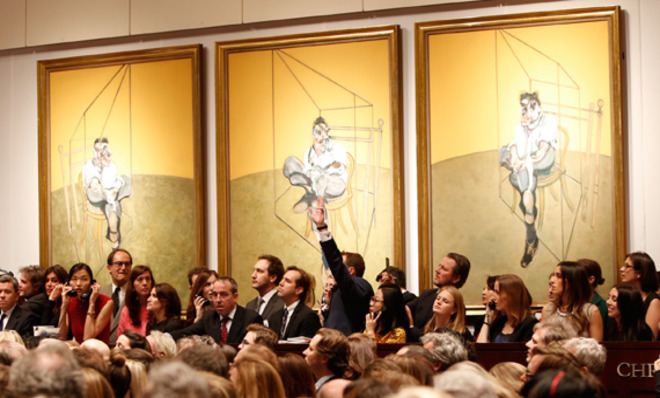Why someone would pay $142 million for one painting
Francis Bacon's "Three Studies of Lucian Freud" sold for a record sum. It probably won't hold its title for long.

A free daily email with the biggest news stories of the day – and the best features from TheWeek.com
You are now subscribed
Your newsletter sign-up was successful
On Tuesday night, Francis Bacon's "Three Studies of Lucian Freud" sold at Christie's for $142.4 million, making it the most expensive painting ever sold at auction.
While that price tag might be unfathomable to nearly everyone, wildly expensive, record-breaking works of art have become a trend in recent years. Bacon's masterpiece dethroned Edvard Munch's "The Scream," which sold just last year at Sotheby's for $119.9 million. Both pale in comparison to the $250 million supposedly spent by Qatar's royal family for Paul Cézanne's "The Card Players" in 2011.
Why would someone spend so much for a single work of art?
The Week
Escape your echo chamber. Get the facts behind the news, plus analysis from multiple perspectives.

Sign up for The Week's Free Newsletters
From our morning news briefing to a weekly Good News Newsletter, get the best of The Week delivered directly to your inbox.
From our morning news briefing to a weekly Good News Newsletter, get the best of The Week delivered directly to your inbox.
Opinion is split on whether or not art is a good investment. Unlike gold or real estate, the value of art is far more subjective, which makes the assessment of their "financial worth harder to gauge on one hand (because you're blinded by the attractiveness of the collectible to your eye) and perhaps irrelevant on the other (if you bought for aesthetic reasons rather than financial ones)," investment adviser Tom Brakke told The Wall Street Journal earlier this year.
From a purely financial view, "in the long run your investment in art may only do about as well as your holdings in bonds — and comes with greater risk," author Noah Horowitz told Newsweek in 2011. Oil will always be valuable. Any artist can fall out of favor over time.
The fact that the street artist Banksy, whose works have sold for up to $1.1 million, sold his paintings anonymously in Central Park for $60 says a lot about the shifting value of art. (He once sold a piece at auction titled, "I Can't Believe You Morons Actually Buy This Shit.")
If art isn't the world's most sound investment, there must be another reason why it's selling for so much. First, it's important to understand who is buying these paintings: A new class of billionaires who skip from New York City to London to Hong Kong, spending millions on everything from cars to homes to private planes.
A free daily email with the biggest news stories of the day – and the best features from TheWeek.com
The problem if you're Joe Billionaire, however, is that any other billionaire can buy the same Maserati that you own. That isn't the case with art, which is why it's so appealing to the super-rich, wrote Horowitz:
The people who are spending record amounts on art buy more than just that glow. (And much more than the pleasure of contemplating pictures, which they could get for $20 at any museum.) They've purchased boasting rights. It's, "You bought the $100 million Picasso?!"… The uselessness of art makes any spending on it especially potent: Buying a yacht is a tiny bit like buying a rowboat, and so retains a taint of practicality, but buying a great Picasso is like no other spending. [Newsweek]
That is good news for auction houses. It might not be good news for the rest of us.
"The art market…is a proxy for the fate of the super-rich themselves," wrote Adam Davidson last year in The New York Times after a Rothko sold for $87 million. He added:
Investors who believe that incomes and wealth will return to a more equitable state should ignore art and put their money into investments that grow alongside the overall economy, like telecoms and steel. For those who believe that the very, very rich will continue to grow at a pace that outstrips the rest of us, it seems like there's no better investment than art. [New York Times]
The anonymous bidder who paid more than $142 million last night might not feel too smug about his or her purchase for long. Some are predicting that Andy Warhol's "Silver Car Crash (Double Disaster)" will beat the new record at Sotheby's tonight.
Keith Wagstaff is a staff writer at TheWeek.com covering politics and current events. He has previously written for such publications as TIME, Details, VICE, and the Village Voice.
-
 The ‘ravenous’ demand for Cornish minerals
The ‘ravenous’ demand for Cornish mineralsUnder the Radar Growing need for critical minerals to power tech has intensified ‘appetite’ for lithium, which could be a ‘huge boon’ for local economy
-
 Why are election experts taking Trump’s midterm threats seriously?
Why are election experts taking Trump’s midterm threats seriously?IN THE SPOTLIGHT As the president muses about polling place deployments and a centralized electoral system aimed at one-party control, lawmakers are taking this administration at its word
-
 ‘Restaurateurs have become millionaires’
‘Restaurateurs have become millionaires’Instant Opinion Opinion, comment and editorials of the day